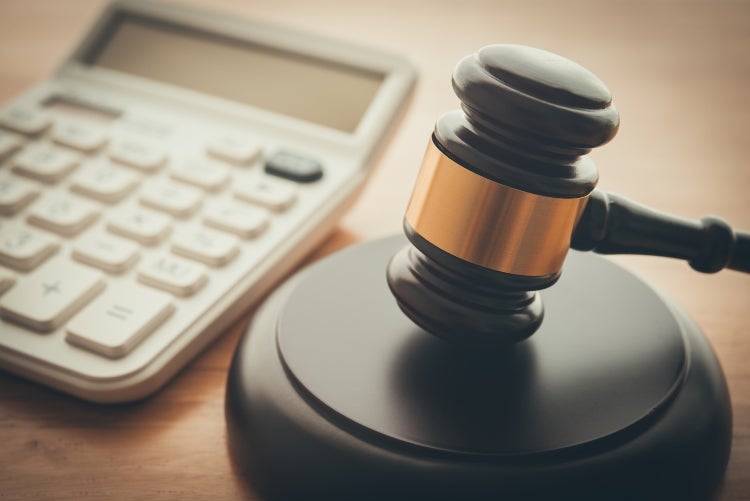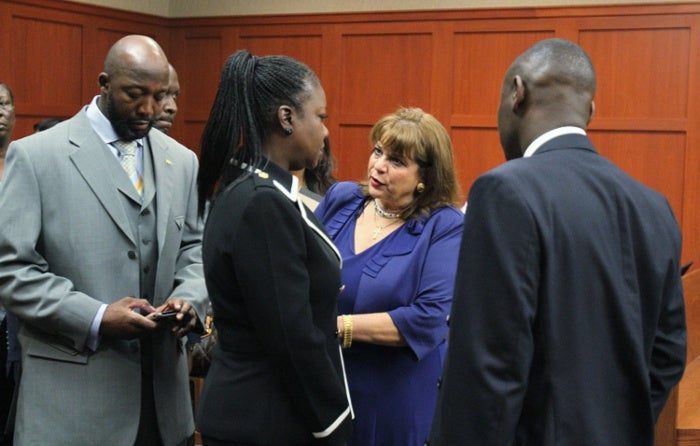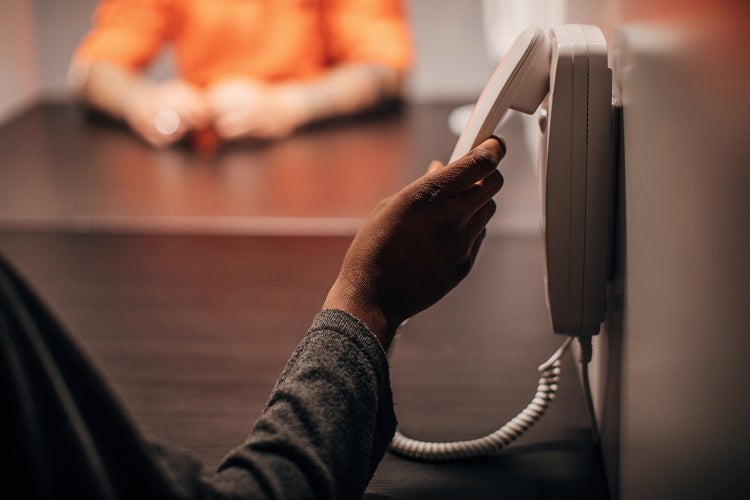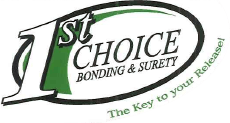-
Limitations on Bail
What You Need to Know About Limitations on Bail in NC
When someone is arrested, securing bail can be a critical first step toward regaining some sense of normalcy. But while getting out on bail is a relief, it’s not a free pass. If you’re released on bail in Concord, NC, it’s important to understand the limitations on bail bonds and punishments that may follow if those terms are violated. At 1st Choice Bonding & Surety, we’re here to help you or your loved one navigate the process confidently and responsibly.

What Is Bail?
Bail is a financial agreement that allows a person accused of a crime to be released from jail while awaiting trial. In most cases, the court sets a monetary amount based on the severity of the crime, criminal history, and flight risk. Bail acts as a guarantee that the accused will return to court after their arraignment for scheduled appearances.
Definition and Purpose of Bail
Bail isn’t a punishment. It’s a legal tool meant to uphold the presumption of innocence while ensuring the accused shows up for court. The idea is to balance the rights of the accused with public safety and court efficiency. However, bail often comes with specific terms and conditions to prevent further legal issues or flight.
Common Bail Restrictions in Concord, NC
When someone is released on bail, it’s not without conditions. These bail bond limitations are decided on a case-by-case basis by the court and must be followed closely to avoid serious consequences, like rearrest, bail revocation, or additional charges. Here are some of the most common restrictions you might encounter while out on bond in Concord, NC.
Obey All Laws
Getting arrested again—especially for the same offense—can affect your trial and potentially result in a higher sentence. Courts expect those released on bail to follow the law at all times. Even minor offenses like traffic violations can raise red flags.
No Drug or Alcohol Use
If your charges are drug- or alcohol-related, expect strict limitations. In many cases, the court will require complete abstinence from drugs and alcohol while out on bail. Random testing may be part of the condition. Violating this can mean immediate jail time and impact your standing in court.
Surrender of Weapons
In certain cases—especially those involving violence or weapons offenses—the court may require the individual to surrender any firearms or dangerous weapons. This condition is intended to reduce the potential for harm while the legal process is ongoing.
Seek or Maintain Employment
Courts often prefer that people on bail are actively working. If you’re unemployed when you’re released, you may be required to seek and secure employment during your pre-trial period. Having a job shows the court you’re taking steps to stay accountable.
No Contact Orders
If your charges involve a specific victim or co-defendant, the court may order you to have no contact with them. This includes phone calls, messages, social media contact, and going near their home or workplace. Violating a no-contact order can lead to immediate jail time.
Travel Restrictions
Most bail agreements include travel limitations, often requiring you to stay within your home county or the state of North Carolina. Traveling outside Concord without permission can be seen as an attempt to flee. Always check with your lawyer before making any travel plans.
Consequences of Violating Bail Terms
Violating any of the bail conditions—whether travel restrictions or contact orders—can result in:
- Immediate arrest
- Revocation of bail
- Loss of the bail amount posted
- Additional criminal charges
- A longer jail sentence if convicted
How to Stay Compliant with Bail Bond Limitations
Being out on bail is a responsibility. Here’s how to stay in compliance:
- Know Your Conditions: Don’t assume anything. Ask your bail agent or attorney for a clear explanation of your bond terms.
- Stay Local: Don’t leave Concord, NC, or the surrounding area without written permission.
- Attend All Court Dates: Missing even one can result in an arrest warrant.
- Avoid Risky Situations: Stay away from known offenders, parties, or any illegal activities.
- Communicate Openly: If anything changes—your address, work status, or transportation—let your bail agent know immediately.
Get Bail Bond Help in Concord, NC
If you’ve been released on bond and need help understanding the limitations on bail bonds in Concord, NC, 1st Choice Bonding & Surety is here to walk you through it. We’ll help you understand your bail conditions, avoid common mistakes, and make sure you stay on the right path while your case is pending. Whether you’ve got questions about bail time limits, travel restrictions, or how no limit bail bonds work, we’ve got your back. Contact us today for straightforward answers and local support you can trust.
-
Bail Bondsman Fees
Bail Bonds Fees: What to Expect in Concord, NC
When someone you love is arrested, one of the first things families ask is: “How do we get them out of jail fast—and how much will it cost?” At 1st Choice Bonding & Surety, we understand the urgency and stress that comes with posting bail. In this guide, we’ll explain what bail bonds are, how they work, and what you need to know about bail bonds fees in Concord, NC.

What Are Bail Bonds and How Do They Work?
When someone is arrested, the court often sets a bail amount—money that must be paid to release the person from custody until their court date. This bail acts as a guarantee that the defendant will appear in court.
Because bail amounts can be high, most people turn to a bail bondsman for help. The bondsman posts the full bail on your behalf, and in return, you pay a bail bondsman fee, which is a small percentage of the total bail. This service allows your loved one to return home quickly, without having to pay the full amount upfront.
What Is a Bail Bondsman Fee?
A bail bondsman fee is the charge you pay for the bondsman’s service in securing someone’s release from jail. In North Carolina, this fee typically ranges from 10% to 15% of the full bail amount, depending on the case.
For example, if bail is set at $5,000, the bail bond fee will usually be $500 to $750. This amount is non-refundable, as it covers the risk and administrative costs involved in posting the bond.
We follow all state-approved fee structures and never surprise you with unexpected charges.
Why Do Bail Bond Fees Exist?
Bail bond fees exist because a bail bondsman takes on a financial risk to secure a defendant’s release from jail. Here’s why the fee is necessary:
- Risk Coverage – When a bail bondsman posts bail, they’re promising the court that the defendant will appear for all scheduled hearings. If the defendant skips court, the bondsman is on the hook for the full bail amount. The bail bondsman fee (typically 10–15%) helps offset that risk.
- Upfront Capital – Posting bail ties up the bondsman’s funds, sometimes for months. The fee helps cover the cost of using that capital and ensures the business can continue helping other clients in similar situations.
- Administrative Work – There’s paperwork, coordination with different jails and courts, and ongoing monitoring involved in every bond. Bail bond fees help cover these operational costs, including staffing, licensing, and 24/7 availability.
- Legal and Regulatory Compliance – Bail bondsmen must meet strict state licensing requirements and operate under regulated fee structures. The fee compensates for the cost of compliance, insurance, and legal oversight that helps protect consumers.
How Much Is a Bail Bondsman Fee in Concord, NC?
The exact cost of a bail bond can vary based on a few key factors, but most bail bondsman fees in Concord, NC fall within that 10–15% range. Here’s what may affect your final fee:
- The bail amount set by the court
- The type and severity of the charges
- The defendant’s history of appearing in court
- Whether collateral is required to secure the bond
Need a quick estimate? Our team is available 24/7 to walk you through your specific situation and give you a clear cost breakdown.
Hidden Costs to Watch For
Not every bail bond agency is upfront about fees. We pride ourselves on transparency, but it’s important to know what to look out for elsewhere. Before signing any agreement, always ask for a full breakdown of fees. Common hidden costs of bail bonds may include:
- Application or processing fees
- Interest charges if you opt for financing
- Late fees for missed payment plan deadlines
- Recovery or forfeiture fees if the defendant skips court
- Collateral management or storage fees
These costs can add up quickly and catch you off guard if you’re not careful.
Factors That Influence Bail Bondsman Fees
Several variables can affect how much a bail bonds fee will be:
- Bail Amount – Since the fee is a percentage, the higher the bail, the higher the fee. A $10,000 bail could mean a $1,000–$1,500 bondsman fee.
- Case Risk – If the defendant is seen as a flight risk or has skipped court in the past, additional terms or collateral may be required.
- Collateral – In some cases, property or vehicles may be used as security against the bond. This doesn’t impact the fee directly but can affect approval.
- Payment Terms – While many bail bond companies offer payment plans, they may come with hidden fees. At 1st Choice, we offer flexible, interest-free payment options with complete transparency.
Tips for Managing Bail Bond Costs
Being prepared can help ease the financial burden. Here are some smart tips to manage bail bond expenses:
- Choose a reputable, licensed bail agency with a history of honest service.
- Make sure you get a written breakdown of all fees before signing.
- Ask about payment plans and make sure you understand the terms.
- Avoid missed court appearances, which can result in forfeited bonds and lost collateral.
- Use a Licensed Bondsman to avoid legal and financial complications.
Your Honest Partner in Concord
If you’re looking for clear, honest bail bonds fees in Concord, NC, 1st Choice Bonding & Surety is your trusted local partner. We know this process can feel overwhelming, so we focus on being upfront and honest about costs. Contact us whenever you need answers or fast support. We’re available 24/7. When it comes to bail bondsman fees in Concord, you can count on 1st Choice Bonding & Surety.
-
Why Do People Choose Bail Bonds Overpaying Bail in Full?
Why Do People Choose Bail Bonds Overpaying Bail in Full?
Do you or a loved one need bail? The goal is simple: get out of jail and get back to life. But should you pay bail in full or go with a bail bond? Because of the financial and practical implications, you should understand these choices thoroughly before deciding. Here’s why people often turn to bail bonds rather than paying bail in full.

How Do Bail Bonds Work?
A bail bond or surety bond is an agreement that allows a defendant to be released from jail while awaiting trial without paying the full bail amount. Imagine bail is set at $8,000—too steep for many people to pay in cash. This is where a bail bond comes in. You work with a bail bondsman, who covers most of the bail on your behalf in exchange for a fee, typically 10% to 15% of the bail amount. So, in this example, you would pay $800 to $1,200 instead of the full $8,000.
The bail bondsman then becomes responsible for ensuring you appear in court. If you follow through, the bail amount will be refunded to the bondsman, and your case will proceed as scheduled. However, if you don’t, both you and the bondsman will face legal consequences. In short, a bail bond eases the financial burden while still holding you accountable.Types of Bail
There are three primary types of bail designed for different situations:
- Cash bail: If you have the financial means, you can pay the entire bail amount upfront in cash. If you attend all required court dates, you’ll get your money back at the end of the legal process.
- Bail bond: This is the most common way defendants post bail. It enables you to get out of jail without emptying your bank account while still remaining accountable.
- Property bond: If you lack cash but own property, a property bond may be an option. Here, you pledge real estate or other valuable assets as collateral. However, if you don’t show up to court, the property you used as collateral may be forfeited.
How to Apply for a Bail Bond in North Carolina
Follow these steps to apply for a bail bond in Concord, Salisbury, Gastonia, or the surrounding areas:
- Contact a reputable bail bondsman: 1st Choice Bonding & Surety is available 24/7 and responds in 5 minutes or less to help you post bond without delay.
- Provide necessary information: Be prepared to provide the defendant’s full name, the charges, the bail amount, and the location of the jail.
- Sign the agreement: The contract outlines the terms and conditions of the bond, including the defendant’s responsibility to attend all court dates.
- Pay the fee: Pay just a fraction of the total bill to the bondsman, who will cover the rest on your behalf.
- Await release: Once the paperwork is complete and the bondsman posts bail, the defendant is typically released within hours. Preparing a legal defense from home is much easier and less stressful than doing so behind bars.
Pros of Bail Bonds
Bail bonds come with several benefits, making them a practical choice for many:
- Affordability: Sometimes, bail is set prohibitively high, which makes paying the full amount unrealistic. Bail bonds bridge the financial gap so defendants aren’t stuck in jail solely due to the inability to pay.
- Speed and efficiency: Bail bondsmen work quickly because they know time is of the essence. Those with 24/7 availability ensure that even late-night arrests don’t have to mean extended jail time.
- Legal guidance: If it’s your first encounter with the criminal justice system, you may be unfamiliar with the bail process. Your bondsman can explain each step so you know what to expect.
Cons of Bail Bonds
Despite the benefits, bail bonds have some potential downsides to keep in mind:
- Non-refundable fees: The fee paid to the bail bondsman is the cost of the service, so unlike cash bail, it won’t be refunded.
- Collateral requirements: In cases involving a high bail amount or specific risks, you may need to put up collateral, which adds risk to the agreement.
- Conditional release: Accepting a bail bond means you agree to attend every court appearance. Skipping a court date could lead to your re-arrest or losing collateral.
Bail Bonds Are the Fastest Path to Freedom
When legal challenges arise, you need a trusted team by your side. With over 20 years of experience and 6 locations in Concord, Salisbury, and Gastonia, 1st Choice Bonding & Surety is the key to your release. We are committed to getting you back home and back on track by accepting down payments as low as 3% on most bonds. We also believe in second chances, so if you ever miss a court date, we’ll work with you to reschedule. Don’t wait—contact us today to get on the fastest path to freedom.
-
How to Get a Bail Bond in Domestic Violence Cases
How to Get a Bail Bond in Domestic Violence Cases in NC
Facing a domestic violence charge is an incredibly difficult experience, both for the accused and their loved ones. The process can be confusing and intimidating, so if you or someone close to you has been arrested for domestic violence, learn about the bail process to reduce stress and ensure a swift release from jail.

What Is Considered Domestic Violence in North Carolina?
Domestic violence is a criminal act perpetrated against a spouse, current or former romantic partner, family member, or someone living in the same household. Consult a domestic violence lawyer to understand the specific charges against you.
Some prevalent offenses related to domestic violence include:- Assault: Physical attacks causing harm or fear of harm
- Battery: Unlawful physical contact or use of force
- Stalking: Repeatedly following or harassing someone, causing fear
- Harassment: Unwanted behavior causing emotional distress
- False imprisonment: Restricting someone’s freedom of movement without legal authority
- Kidnapping: Forcibly taking or restraining someone against their will
- Sexual abuse: Any non-consensual sexual act
- Child abuse: Physical, emotional, or sexual abuse directed at a minor
- Elder abuse: Physical, emotional, or financial abuse directed at an elderly person, particularly if the abuser is in a position of trust or care
Legal Rights for Domestic Violence Defendants
As a defendant, you have certain legal rights that protect you throughout the process. Working with a domestic violence attorney is the first step to ensuring these rights are respected.
The most prominent rights of domestic violence defendants include:- The right to be presumed innocent until proven guilty
- The right to an attorney
- The right to a fair and impartial trial
- The right to present evidence in your defense
- The right to be free from unreasonable searches and seizures
The Procedure for Bail Bonds in Domestic Violence Cases
The bail process for domestic violence cases in North Carolina follows several steps:
- Arrest and booking: Following an arrest for domestic violence, the accused is taken to a local jail, where the booking process begins. This includes recording personal details, taking fingerprints, noting the charges, and gathering other pertinent information.
- Initial court appearance: Within 48 hours, the defendant will have an initial appearance before a judge, who will set the bail amount based on the severity of the charges, the defendant’s prior criminal history, and the likelihood of fleeing.
- Posting bail: If the judge sets bail, you can secure your release by paying the full amount or obtaining a bail bond through a licensed bail bondsman. Bail bonds are often preferred, especially when the bail amount is high. Note that in domestic violence cases, defendants are usually put on a 24-hour hold before being permitted to post bail.
- Release: Once the bail is posted, the defendant is released from jail and expected to return on all future court dates. Failure to appear results in further penalties and may require the bondsman to locate the defendant and bring them back into custody.
How to Get a Domestic Violence Bail Bond in North Carolina
Securing a bail bond is usually the best option when faced with a high bail amount. Here’s what the process entails in North Carolina:
- Determine the bail amount: Bail could be set as low as $500 to $1,000 for minor first offenses. Repeat or severe offenses lead to far higher amounts or even denial of bail.
- Contact a bail bondsman: Once bail is set, call a reputable bail bondsman for help. This licensed professional will post bail on your behalf for a fee totaling 10% to 15% of the full amount. For instance, if bail is set at $5,000, expect to pay $500 to $750 to secure a bond.
- Sign the bail agreement: This contract states that the defendant will attend all future court dates or be liable for the full bail amount.
- Release from custody: With the paperwork and payment complete, the bondsman posts bail, and the defendant is released from jail. They are free to return home and begin preparing for court appearances.
Ready to Secure Your Release? We’re Here to Help
Time is of the essence when securing your release or that of a loved one facing a domestic violence charge. 1st Choice Bail Bonding & Surety is the best option for getting you back home and back on track because we accept down payments as low as 3% on most bonds. We have over 20 years of experience and multiple locations across Concord, Salisbury, and Gastonia, NC, to better serve you. Our goal is to build lasting relationships with our clients, so we offer flexible solutions if you need assistance rescheduling a missed court date. Our team is available 24/7, and we respond in 5 minutes or less, so don’t wait another moment—contact us today!
-
What to Do If Your Loved One Gets Arrested
What to Do If Your Loved One Gets Arrested
Getting a call that your loved one has been arrested is stressful and overwhelming. It’s natural to feel unsure about what to do next. The good news is that you can take action from the outside to help your friend or family member get out of jail sooner. Here’s what to do.

Gather Information
When your loved one is arrested in North Carolina, the first step is to gather as much information as possible about the situation, including:
- Where they are being held: This could be a local jail or a county facility.
- The charges they’re facing: Are they accused of a minor offense like trespassing, or are the charges more serious?
- Their bail amount: Bail is the money you’ll need to post to have your loved one released from jail until their court date.
Contact a Defense Lawyer
Reaching out to a defense attorney is an important step. A lawyer can guide you through the legal system and help protect your loved one’s rights. Depending on the situation, you may want to consult a lawyer who specializes in wrongful arrest, arrest warrants, or accusations of resisting arrest. It’s important to hire a lawyer familiar with local laws in North Carolina, especially if the arrest was unexpected.
Ask the Right Questions
Here’s what to ask to help you make the right decisions:
- How long will my loved one be in custody? In most cases, the police can hold a suspect for up to 24 hours without formally charging them. This timeframe is extended for serious offenses. If the suspect is charged with a crime, they will either be detained until their first court appearance or released on conditional bail, where they must follow specific conditions until their hearing.
- Can I speak to them while in custody? Yes, you can typically contact your loved one while they are in jail. Offer them support and reassurance, and explain that you’re working on getting a lawyer. Remember, calls from jail are monitored, so avoid discussing details about the case over the phone, as anything they say could be used against them in court.
- Are there any errors in the paperwork? Make sure you understand the charges your loved one is facing by reading the official arrest paperwork. Confirm that all information, such as the date, time, and location of the arrest, is correct. Address any errors right away.
- When are the upcoming court dates? Once bail is posted, keeping track of court dates and legal deadlines is essential. Missing a court appearance could cause a bench warrant to be issued against your loved one, and they may forfeit bail.
Cooperate with the Authorities
While it’s natural to feel upset or frustrated when a loved one is arrested, arguing or becoming combative with the police or jail staff doesn’t help anything. Instead, remain calm and cooperate when asked for information or paperwork. This helps things move smoothly and gives you a better chance of getting your loved one out of jail sooner.
Understand How Bail Works
One crucial step when your loved one gets arrested is posting bail. This allows them to go home while awaiting their court date, giving them time to meet with their lawyer and prepare their defense.
Bail is a sum of money that acts as insurance between the court and the accused. The amount is set by the court based on the severity of the charges and the likelihood of the person fleeing before their trial. If you can afford the full bail amount, pay it directly to the court, and your loved one will be released. This is called a cash bond. However, bail amounts are often set very high, so you may not have that kind of money on hand. That’s where a bail bond comes in.
A bail bond is when a company posts the full amount on your behalf in exchange for a 10% to 15% fee. Keep in mind that this percentage is a fee for the bail bond agent’s services and is non-refundable. If your loved one misses a court date, most bond companies immediately revoke the bond. However, 1st Choice Bonding & Surety works with clients to help them reschedule their court dates and avoid additional penalties.
When Time is of the Essence
Do you need help posting bail after your loved one has been arrested? 1st Choice Bonding & Surety is available 24/7 to assist. With over 20 years of experience and multiple locations across Concord, Salisbury, and Gastonia, NC, we have the expertise to guide you through the bail process. We are committed to fast response times and building relationships with our clients. Act quickly and contact us today! We are the key to your loved one’s release.
-
Demystifying Warrants: What You Need to Know
Demystifying Warrants in NC: What You Need to Know
Facing a warrant can be overwhelming, especially when you’re unsure what steps to take next. Whether it’s for a missed court date, failure to pay fines, or an unexpected charge, demystifying warrants can help you know what to do if you’re served with a warrant in North Carolina.

What Is a Warrant?
A warrant is a legal document issued by a judge that authorizes law enforcement to take a specific action, such as arresting someone, searching a property, or seizing evidence. Warrants are based on probable cause, meaning law enforcement must show the court that there is sufficient reason to believe a crime has been committed.
Types of Warrants
Warrants come in different forms, depending on the action law enforcement is authorized to take.
- Arrest warrants are the most well-known types of warrants. An arrest warrant authorizes police to take someone into custody if they are suspected of committing a crime. These warrants can be issued for serious offenses or minor infractions. If you have an open arrest warrant, it’s recommended that you handle it quickly to avoid a surprise arrest at home, at work, or during a routine traffic stop.
- Bench warrants are issued when a person fails to appear in court after being summoned. If you miss a court date—whether for a traffic ticket, criminal charge, or other legal matters—a bench warrant can be issued for your arrest. Unlike arrest warrants, bench warrants don’t require probable cause of a crime, only proof that you missed your scheduled court appearance.
- Search warrants allow police to search a specific location for evidence related to a crime. A search warrant must clearly describe the location to be searched and the items law enforcement is looking for. If the police show up with a search warrant, you have the right to ensure the search is conducted according to the warrant’s terms.
- Civil warrants are typically used for non-criminal issues, like when someone owes a debt. For example, if you fail to pay court-ordered child support or other financial obligations, a civil warrant could be issued against you.
What Should You Do If You’re Served with a Warrant?
Finding out there’s a warrant for your arrest in North Carolina is alarming news. Here’s what you should do if you’re served with a warrant:
- Read it carefully: Make sure you understand the warrant’s purpose. Is it an arrest warrant, a bench warrant, or something else? The warrant should specify what action law enforcement is authorized to take and the charges against you. Note the jurisdiction that issued the warrant, the issuing judge’s signature, and whether there are any missing or incorrect details that invalidate the warrant.
- Exercise your rights: You have the right to remain silent and the right to an attorney, even if you’re not yet under arrest. If the police come to your home or workplace to serve a warrant, ask to see the warrant and verify its details before answering any questions.
- Check for open warrants: If you’re unsure whether a warrant has been issued against you, check with local law enforcement or search online databases for open warrants in North Carolina so you can address the situation before it escalates.
- Consider turning yourself in: Ignoring an arrest or bench warrant won’t make it go away, and you may be arrested at the worst possible time. Turning yourself in shows the court that you’re willing to cooperate and may lead to a more favorable outcome, such as the option to post bail immediately and avoid jail time while you await your trial.
- Work with a bail bondsman: If you’re arrested and need to post bail, a bail bondsman can help. They will post the full amount of your bail for a 10% to 15% fee, which allows you to be released from jail until your court date.
Take Action and Secure Your Release
The longer you wait to address an open warrant, the worse the situation can become. Dealing with the situation quickly and calmly is the best way to protect your freedom and future.
If you or someone you know has been arrested and is looking to post bail, 1st Choice Bonding & Surety is the right place to turn. We have offered bail bonding services for over 20 years, with 6 locations across Concord, Salisbury, and Gastonia, NC. We understand the stress and urgency of your situation, which is why we’re available 24/7 and respond within 5 minutes or less. Contact us today for the trusted help you need when legal challenges arise.
-
Types of Domestic Violence Charges
Types of Domestic Violence Charges
Many people believe that “domestic violence” is a specific criminal charge, but in North Carolina, it’s actually an umbrella term that encompasses various offenses. These crimes occur between individuals in close relationships—such as spouses, partners, or family members—and can range from physical violence to emotional manipulation. Understanding the different types of domestic violence helps you know your rights and what to expect if you’re arrested on these charges.

Criminal Offenses Classified as Domestic Violence
Here is a breakdown of what is considered domestic violence in North Carolina.
Physical Abuse
Physical abuse covers any bodily harm or threat of harm to the victim. Specific offenses may be charged based on the details of the incident.
- Simple assault: This is a common charge in domestic violence cases. It typically involves minor injuries or the threat of violence without a weapon. Even a small physical altercation, like a shove or slap, can result in a simple assault charge.
- Assault on a female: Only men over 18 can be charged with this crime. Although it seems unfair under the Equal Protection Clause in the Constitution, North Carolina Courts have upheld its legality.
- Assault on a child: This charge applies when the victim is a child under 12, making it particularly serious in domestic violence situations involving family members or caregivers.
- Assault with a deadly weapon: The charge is upgraded when a weapon is involved, even if it doesn’t cause physical harm. Weapons can include anything from knives and guns to household items used with intent to harm.
Emotional and Psychological Abuse
This type of domestic violence involves actions that intimidate, control, or instill fear. While not always visible, emotional abuse can still lead to criminal charges.
- Communicating threats: This charge is filed when someone verbally or in writing threatens physical harm to another person. It’s common in situations where emotional manipulation and intimidation are used to maintain control over a victim.
- Stalking and harassment: These charges apply when the accused repeatedly follows or contacts the victim, causing fear for their safety. Harassment can occur in person or through digital means, like texts or social media.
Sexual Abuse
Sexual abuse in domestic violence cases refers to any non-consensual sexual activity. Charges under this category range from sexual assault to rape, and they carry heavy penalties due to the physical and emotional trauma involved.
- Sexual battery: This charge involves non-consensual sexual contact, which can include unwanted touching of a sexual nature.
- Rape: This is a more severe charge involving non-consensual penetration. In domestic situations, it is often accompanied by other forms of abuse, like physical violence or coercion.
Economic Abuse
Economic abuse occurs when one partner controls the other’s financial resources, limiting their ability to leave the relationship or become self-sufficient. While there are no specific criminal charges called “economic abuse,” related charges may apply.
- Theft: If one partner takes money or property from the other without consent, they can be charged with theft.
- Coercion or fraud: These charges may arise if someone manipulates their partner financially, forcing them to make financial decisions or transactions under duress.
Digital Abuse
In today’s tech-driven world, abusers may use technology to intimidate or control victims. This often involves tracking someone’s movements or harassing them online.
- Cyberstalking: This involves using electronic means to harass or intimidate someone. In domestic violence situations, it often goes hand-in-hand with emotional or psychological abuse.
- Unauthorized access: Gaining access to a partner’s private digital accounts without permission can result in criminal charges, especially if used to manipulate or control.
The Bail Process for Domestic Violence Charges
When someone is arrested for domestic violence in North Carolina, the immediate goal is usually to post bail. The judge sets the bail amount based on the charge’s severity, any previous criminal history, and whether the defendant poses a risk to the victim. The process can be confusing, and securing a bond quickly is essential to minimize the time in jail.
If you’re unable to post bail on your own, a bail bond company can help. Bonding agents charge a non-refundable fee—usually 10% to 15% of the total bail amount. Once the fee is paid, the bondsman guarantees the full bail to the court, allowing the defendant to be released. This makes it easier for individuals to prepare for their legal cases from home rather than behind bars.
Trusted Bail Bond Services in North Carolina
Being arrested on domestic violence charges is stressful. When such legal challenges arise, you need a trusted team by your side. 1st Choice Bonding & Surety has over 20 years of experience paving a path to freedom for our clients. Our 6 convenient locations in Concord, Salisbury, and Gastonia allow us to respond to your call for help in 5 minutes or less. Trust us to be the key to your release—request bail bond services today.
-
Learn When to Contact a Bail Bondsman in Concord, NC

Incarceration is an overwhelming experience that can be difficult to navigate alone. However, before dialing your lawyer, it’s imperative to focus on your immediate release with a trusted bail bonds service. Discover expert bail bonds guidance with 1st Choice Bonding & Surety in Concord, NC, to eliminate the guesswork.When to Consider Hiring a Bail Bonding Company
When you or a loved one has been arrested, hiring a bail bond agent should be your first action. Once you are booked and processed, the magistrate will determine your bail. Your next move is to contact 1st Choice Bonding & Surety to post bail on your behalf immediately.
The Role of a Bail Bond Agent
A bail bond agent handles bail proceedings in exchange for a nonrefundable fee equal to 15% or less of the total bail amount. Once the fee is satisfied, the bail bondsman works out a surety bond with the court. This secures the defendant’s release without the burden of challenging bail payments.
The Benefits of Hiring a Bail Bondsman vs a Lawyer
The backing of a lawyer and bail bondsman are equally important. However, it’s advantageous to contact a bail bond agent first. Lawyers guide you through your legal proceedings, but you must first secure release to begin your defense. That’s where the expertise of a bail bond agent takes precedence.
The Advantages of Calling a Bail Bond Agent
The assistance of a full-service bail bonding company is paramount. When you call a bail bondsman first, you gain access to unrivaled advantages, including:
- Achieve an expedited release
- In-depth local legal system knowledge and connections
- Documentation assistance
- More affordable
Avoid Wrongful Convictions
Prosecutors try to gain leverage by offering plea bargains. Plea bargains involve a guilty plea in exchange for reduced charges and less jail time. However, they also result in criminal records and convictions for crimes that may not have been committed. To avoid this, prioritize a streamlined release to build your defense with a trusted bail bondsman.
What to Expect From a Reputable Bail Bonds Officer
Trusting in a reputable bail bonds officer expedites your release from incarceration and provides unwavering support and peace of mind. When you choose a reputable bail bond service, you can expect the following:
- Legal system connections
- Confidentiality, respect, and the highest ethical standards
- Professionalism and transparency
Understanding Bail Amounts & Payments
After being arrested, you will appear in front of a magistrate who will determine the bail amount. This bail amount is based on the accused crime, the defendant’s criminal history, and other associated factors. To secure release, this amount can be paid in full to the jail or satisfied using a bail bonds service.
How a Bail Bonds Service Works
Rather than pay the full sum of bail to the jail, you may save money, time, and stress by working with a full-service bail bonding company. This process involves paying a bail bondsman a percentage of the total bail amount in order for them to solicit and negotiate bail on your behalf.
How Your Bail Bond Agent Can Help
The bail bonds process is simple and cost-effective. First, you must contact a bail bondsman to create an order for release in exchange for a nonrefundable fee. The fee can be paid in cash, by card, or by providing collateral. The bail bondsman then provides the court with the paperwork to secure the defendant’s release.
What Your Bail Bond Agent Will Require From You
Before getting started with a bail bonds service, it’s important to have the necessary information. To secure bail bonds, a bail bond agent will ask you for the following:
- Defendant’s arrest information, booking number, and charges
- Fee payment and/or collateral
Discover Full-Service Bail Bonds in Concord, NC
1st Choice Bonding & Surety is here to uphold and protect your freedom by helping you streamline your release. As a full service bail bonding company, our offerings include:
- Swift pick-ups and surrenders
- Discreet apprehensions
- Handling failure to appear warrants
Get Started With Concord, NC’s Trusted Bail Bonding Company
If you or a loved one has been arrested, look no further than 1st Choice Bonding & Surety. Our confidential, efficient, and reliable bail bonds service is the key to securing immediate release to get started on your defense. Contact our experts for 24 hour bail bonds.
